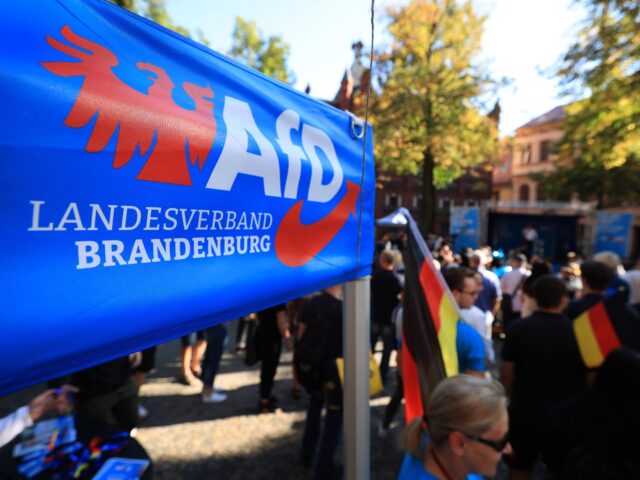The anti-mass migration Alternative for Germany (AfD) party is officially the strongest faction in East Germany following the regional elections in Brandenburg on Sunday.
Despite a narrow defeat to the Social Democrats (SPD) in the north-eastern state of Brandenburg, the populist Alternative for Germany party can now boast having the most state parliament seats in the former East Germany. According to calculations from broadcaster NTV, the AfD control 138 seats in the East, surpassing the neo-liberal centre-right Christian Democrat Union following the vote in Brandenburg.
The CDU — the party of former Chancellor Angela Merkel — will now only have 128 seats in the East. Before Sunday, both the AfD and CDU were tied at 131 state parliament seats in the socially conservative former Soviet controlled part of the country.
The shift in balance of power towards the right comes after the AfD’s victory in Thuringia, which represented the first time the party came out on top in a state election in its history with 32.8 per cent of the vote.
The populist party also secured a strong second-place showing in Saxony with 30.6 per cent of the vote. In Brandenburg on Sunday, the AfD secured 29.2 per cent of the vote, barely behind the SPD at 30.9 per cent.
Results in Brandenburg also confirmed the staying power of the upstart leftist-populist party of Sahra Wagenknecht, a political firebrand who broke from the Left party over her opposition to the war in Ukraine and mass migration.
Wagenknecht’s eponymous BSW party won 13.5 per cent of the vote in Brandenburg, besting the 12.1 per cent for the CDU, which continues to struggle to regain trust after former leader Merkel opened the floodgates to mass migration in 2015.
Despite aligning with the AfD on key issues, Wagenknecht has ruled out an alliance with the right-wing party, joining the so-called cordon sanitaire of establishment parties to block the AfD from joining any government, be it at the state or federal level.
Yet, with the collapse of support for the Green party, over failures of climate-inspired energy policy and continued support for mass migration, Wagenknecht may be seeking to replace the Greens as a coalition party of the Social Democrats. Such an alliance would likely come with a demand that the SPD finally reverse course on migration.
However, following disappointing results in regional elections and struggles in national polling, the governing SPD may be in a state of flux. Although Olaf Scholz has committed to running for a second term as chancellor, his party essentially abandoned him in the Brandenburg campaign. Rather than running on the chancellor’s record, the local Social Democrats focussed on regional leader Dietmar Woidke instead, refusing to even feature pictures of Scholz on any campaign material.
Social Democrat co-leader Lars Klingbei attempted to quell discussion about a leadership change, saying on Monday that there is “absolutely no wobbling… In the leadership of the party, the parliamentary group, among the state governors and ministers, there is no discussion about this in any place.”

COMMENTS
Please let us know if you're having issues with commenting.